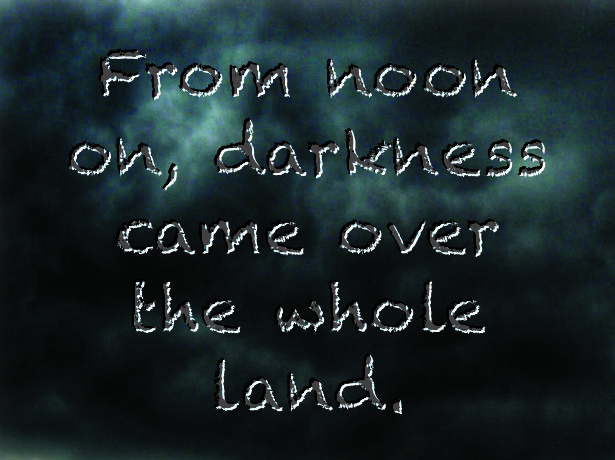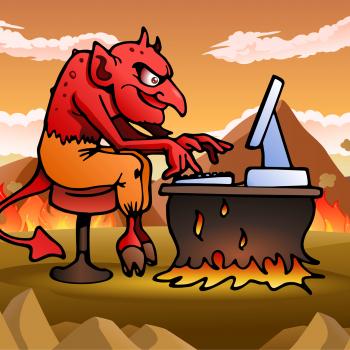
As we repeatedly mend the curtain, as we reinforce the barrier with each stitch, we work to make sure the darkness stays.
Everyone has heard that, at the moment of Jesus’ crucifixion, darkness came over the whole land.
But few seem to know or understand what follows, “At that moment [the moment of Jesus’ death as described by Matthew] the curtain of the temple was torn in two, from top to bottom.”
The implications of this statement? “All barriers between Me and you are now gone, erased, eliminated. Come freely to the seat of mercy. Let nothing get in your way.”
That curtain represented the inaccessibility of God. It enclosed the Holy of Holies, the place of the Mercy Seat, the home of the ark (of Raiders of the Lost Ark fame), with the golden angels arched over it. Religious rules denied access to all but one.
Once a year, only after a day of national fasting, of confession of sin, and of multiple sacrifices made to express the sorrow and unworthiness of humanity, the High Priest could come face to face with Mercy.
Anyone entering otherwise, i.e., unworthy of being in the Holy Presence, would be immediately struck dead. This scene, fictional as it is, captures the horror pretty well.
It is finished
But those symbolic words, “the curtain of the temple was torn in two” written by the most Jewish of the Gospel writers, signified the end of the barrier between humanity and God.
No longer did people need to approach God in fear, approach mediated by priests, approach preceded by the purchase of multiple animals for blood sacrifices.
Jesus’ death ended that forever.
It is finished.
The old way, the way of massive barriers to mercy, of using fear to force obedience, of a coercive relationship to God enforced by a privileged class, had ended.
It was no more.
It is finished
But, of course, it didn’t take long for humanity to rebuild it.
You see, we just don’t like that kind of freedom and we certainly don’t want to give it to others.
Early Christians quickly imitated the priestly rules and regulations as they set up ways to limit access to God. Again, it must be mediated by blood and by power.
Under these limiting rules, God is indeed a bloodthirsty, vengeful, “stay far away, mortal” deity. This God happily murders innocents and deprives women/people of color/any non-cisgendered person of basic human dignity and rights.
But Jesus offered us something entirely new: a place where human methods of ranking those who are in and those who are out no longer exists. He more than welcomed everyone. He went to the least enfranchised, the most outcast, and gave them access.
We work to shut down free, fresh winds
But every time a free, fresh wind from the Holy Spirit blows, a wind infused with grace, redolent with the odors of mercy, we work to regulate it.
Humans need limited power and layers of privilege to rank themselves. We don’t like the idea that all might receive mercy. We prefer fences, borders, and a distinct non-privileged group. Some must go to hell if the “right” ones are going to heaven. And we want to power to determine the hellbound.
But that’s not the gospel. That’s not the message of the crucifixion. That’s not the message of the torn curtain. That is the message of darkness.
Truth? It is finished.
We are free to drink of the fullness of the Cosmic Lover, the giver of grace, the one who IS mercy.
What we are not free to do is deny this to others. We are not free to repair that curtain and hide God from others.
The church is not the state. The state needs barriers and rules because this is how we establish civilizations. The church certainly needs structure. But we must base it on the I-Thou relationship, not coercive methods and limitations to God.
We are not to hoard power but to give it away.
It is my growing belief that the more the church models itself after the state, the less useful it becomes at being the gathered people of God.
As we repeatedly mend the curtain, as we reinforce the barrier with each stitch, we work to make sure the darkness stays.
What should have been finished has to be started over yet once more. That’s resurrection. May we all find new mercies in the coming days.

















